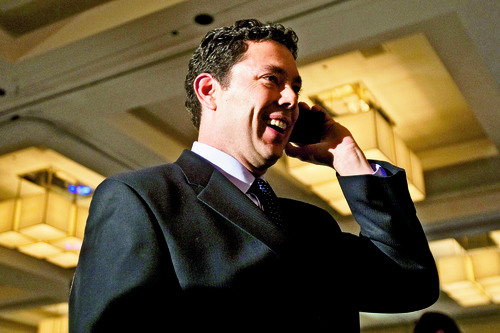This is an archived article that was published on sltrib.com in 2014, and information in the article may be outdated. It is provided only for personal research purposes and may not be reprinted.
Rep. Jason Chaffetz, R-Utah, on Monday opposed the Count My Vote initiative, which seeks to replace Utah's political caucus and convention system with direct primaries.
His stance came the day after Count My Vote backers touted former Republican presidential nominee Mitt Romney's endorsement of the initiative.
Chaffetz, who campaigned for Romney's failed White House bid in 2012, told lawmakers in his annual appearance before the Utah Legislature that he never would have been able to oust 12-year incumbent Rep. Chris Cannon, R-Utah, without the present caucus system.
"When I was a nobody trying to become a somebody, I didn't have any name ID" nor big money, Chaffetz said. But he said he labored long to contact delegates about his ideas, which he could afford.
"I was going up against people who had a lot of money and a lot of name ID," which would have favored them in just a direct primary, he said. "The only way I could get through that process, I'm convinced, is that I had to go out and make the case" with delegates, "and I did that for 2½ years."
Now in his third U.S. House term, Chaffetz said he fears the consequences of Count My Vote. "I'm worried that the people who will be able to run are only those who can have access to millions of dollars."
As an incumbent now, Chaffetz said, "Now that I do have name ID and I can raise a lot of money, I still feel the most important thing is I have to roll up my shirt sleeves and go … and justify my existence" to delegates "or I, too, will be displaced. That is the way it should be."
He added, "We can't allow this big name ID and big dollars to dominate the process."
Rep. Jon Stanard, R-St. George, released legislation Monday requiring anyone signing a ballot initiative or referendum to acknowledge that they have read the proposed change to the law and support the measure.
Stanard, who opposes Count My Vote, said his bill wouldn't affect the current initiative, but addresses what he sees as a shortcoming in the process.
"I've watched people gathering signatures and in my opinion they purposefully keep it as superficial as they can," Stanard said. "I just want to have people understand this is a decision that has the ability to change state law should it go through because, in my opinion, I don't think most people do."
Stanard said he is willing to change the statement so those who support putting a proposal on the ballot but might not be inclined to vote for it could still abide by the statement.
On other topices, Chaffetz also applauded attempts by the Legislature to obtain control over most federal public lands in Utah and praised it for making the case "that Utah was due these lands a long time ago" in promises made at statehood.
"We have to continue to make that case" in Congress, Chaffetz said. "We have to pursue all fronts. It's a huge educational process. ... It's a very difficult proposition."
In the Senate, Chaffetz was asked by Sen. Jim Dabakis, D-Salt Lake City and chairman of the Utah Democratic Party, about requiring members of Congress to raise certain amounts of money to be on top committees.
"This just seems, from a Utah perspective, to be, if not outright corruption, as close as anything can be," Dabakis said.
Chaffetz said fundraising is taken into consideration by leadership, because a party has to be in the majority if members of Congress want to head committees. But as long as it is transparent, Chaffetz said, people giving money to political campaigns is "a beautiful part of our system."
Robert Gehrke contributed to this story.



